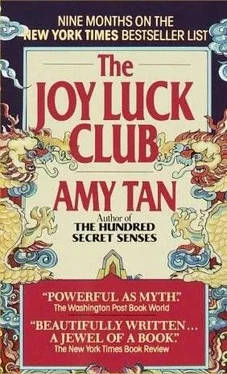She spun me around to inspect her handiwork. I was roasting in the lined silk jacket and pants obviously made with a cooler day in mind. My scalp was burning with the pain of Amah's attentions. What kind of day could be worth so much suffering?
"Pretty," pronounced Amah, even though I wore a scowl on my face.
"Who is coming today?" I asked.
" Dajya "-All the family-she said happily. "We are all going to Tai Lake. The family has rented a boat with a famous chef. And tonight at the ceremony you will see the Moon Lady."
"The Moon Lady! The Moon Lady!" I said, jumping up and down with great delight. And then, after I ceased to be amazed with the pleasant sounds of my voice saying new words, I tugged Amah's sleeve and asked: "Who is the Moon Lady?"
"Chang-o. She lives on the moon and today is the only day you can see her and have a secret wish fulfilled."
"What is a secret wish?"
"It is what you want but cannot ask," said Amah.
"Why can't I ask?"
"This is because…because if you ask it…it is no longer a wish but a selfish desire," said Amah. "Haven't I taught you-that it is wrong to think of your own needs? A girl can never ask, only listen."
"Then how will the Moon Lady know my wish?"
"Ai! You ask too much already! You can ask her because she is not an ordinary person."
Satisfied at last, I immediately said: "Then I will tell her I don't want to wear these clothes anymore."
"Ah! Did I not just explain?" said Amah. "Now that you have mentioned this to me, it is not a secret wish anymore."
During the morning meal nobody seemed in a hurry to go to the lake; this person and that always eating one more thing. And after breakfast everybody kept talking about things of little consequence. I grew more worried and unhappy by the minute.
"…Autumn moon warms. O! Geese shadows return." Baba was reciting a long poem he had deciphered from ancient stone inscriptions.
"The third word in the next line," explained Baba, "was worn off the slab, its meaning washed away by centuries of rain, almost lost to posterity forever."
"Ah, but fortunately," said my uncle, his eyes twinkling, "you are a dedicated scholar of ancient history and literature. You were able to solve it, I think."
My father responded with the line: "Mist flowers radiant. O!…"
Mama was telling my aunt and the old ladies how to mix various herbs and insects to produce a balm: "This you rub here, between these two spots. Rub it vigorously until your skin heats and the achiness is burned out."
"Ai! But how can I rub a swollen foot?" lamented the old lady. "Both inside and outside have a sour painful feeling. Too tender to even touch!"
"It is the heat," complained another old auntie. "Cooking all your flesh dry and brittle."
"And burning your eyes!" exclaimed my great-aunt.
I sighed over and over again every time they started a new topic. Amah finally noticed me and gave me a mooncake in the shape of a rabbit. She said I could sit in the courtyard and eat it with my two little half-sisters, Number Two and Number Three.
It is easy to forget about a boat when you have a rabbit mooncake in your hand. The three of us walked quickly out of the room, and as soon as we passed through the moongate that led to the inner courtyard, we tumbled and shrieked, running to see who could get to the stone bench first. I was the biggest, so I sat in the shady part, where the stone slab was cool. My half-sisters sat in the sun. I broke off a rabbit ear for each of them. The ears were just dough, no sweet filling or egg yolk inside, but my half-sisters were too little to know any better.
"Sister likes me better," said Number Two to Number Three.
" Me better," said Number Three to Number Two.
"Don't make trouble," I said to them both. I ate the rabbit's body, rolling my tongue over my lips to lick off the sticky bean paste.
We picked crumbs off one another, and after we finished our treat it grew quiet and once again I became restless. Suddenly I saw a dragonfly with a large crimson body and transparent wings. I leapt off the bench and ran to chase it, and my half-sisters followed me, jumping and thrusting their hands upward as it flew away.
"Ying-ying!" I heard Amah call, and Number Two and Number Three ran off. Amah was standing in the courtyard and my mother and the other ladies were now coming through the moongate. Amah rushed over and bent down to smooth my yellow jacket. " Syin yifu! Yidafadwo!" -Your new clothes! Everything, all over the place!-she cried in a show of distress.
My mother smiled and walked over to me. She smoothed some of my wayward hairs back in place and tucked them into my coiled braid. "A boy can run and chase dragonflies, because that is his nature," she said. "But a girl should stand still. If you are still for a very long time, a dragonfly will no longer see you. Then it will come to you and hide in the comfort of your shadow." The old ladies clucked in agreement and then they all left me in the middle of the hot courtyard.
Standing perfectly still like that, I discovered my shadow. At first it was just a dark spot on the bamboo mats that covered the courtyard bricks. It had short legs and long arms, a dark coiled braid just like mine. When I shook my head, it shook its head. We flapped our arms. We raised one leg. I turned to walk away and it followed me. I turned back around quickly and it faced me. I lifted the bamboo mat to see if I could peel off my shadow, but it was under the mat, on the brick. I shrieked with delight at my shadow's own cleverness. I ran to the shade under the tree, watching my shadow chase me. It disappeared. I loved my shadow, this dark side of me that had my same restless nature.
And then I heard Amah calling me again. "Ying-ying! It is time. Are you ready to go to the lake?" I nodded my head and began to run toward her, my self running ahead. "Slowly, go slowly," admonished Amah.
Our entire family was already standing outside, chatting excitedly. Everybody was dressed in important-looking clothes. Baba was in a new brown-colored gown, which while plain was of an obviously fine-quality silk weave and workmanship. Mama had on a jacket and skirt with colors that were the reverse of mine: black silk with yellow bands. My half-sisters wore rose-colored tunics and so did their mothers, my father's concubines. My older brother had on a blue jacket embroidered with shapes resembling Buddha scepters for long life. Even the old ladies had put on their best clothes to celebrate: Mama's aunt, Baba's mother and her cousin, and Great-uncle's fat wife, who still plucked her forehead bald and always walked as if she were crossing a slippery stream, two tiny steps and then a scared look.
The servants had already packed and loaded a rickshaw with the day's basic provisions: a woven hamper filled with zong zi -the sticky rice wrapped in lotus leaves, some filled with roasted ham, some with sweet lotus seeds; a small stove for boiling water for hot tea; another hamper containing cups and bowls and chopsticks; a cotton sack of apples, pomegranates, and pears; sweaty earthen jars of preserved meats and vegetables; stacks of red boxes lined with four mooncakes each; and of course, sleeping mats for our afternoon nap.
Then everybody climbed into rickshaws, the younger children sitting next to their amahs. At the last moment, before we all set off, I wriggled out of Amah's grasp and jumped out of the rickshaw. I climbed into the rickshaw with my mother in it, which displeased Amah, because this was presumptuous behavior on my part and also because Amah loved me better than her own. She had given up her own child, a baby son, when her husband had died and she had come to our house to be my nursemaid. But I was very spoiled because of her; she had never taught me to think about her feelings. So I thought of Amah only as someone for my comfort, the way you might think of a fan in the summer or a heater in the winter, a blessing you appreciate and love only when it is no longer there.
Читать дальше












